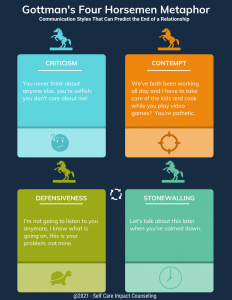Relationships can suffer for many, many reasons. There is one factor, however, that stands out as a predictor of trouble. That is contempt. None other than John Gottman, a widely respected relationship expert, calls contempt the biggest threat to any relationship. By official definition, contempt relates to treating someone as if they were “worthless” or “deserving scorn.”
In real life, it may not be that simple to recognize. This is particularly dangerous. The more time contempt has to fester, the more problems it can create. Hence, your first step may be to identify contempt in action. From there, it must be addressed ASAP.
Recognizing the 5 Signs of Contempt in Your Relationship
1. Disrespectful Communication Habits
- Not listening: Ignoring your partner’s words and feelings.
- Interrupting: Cutting off your partner before they finish speaking.
- Finishing their sentences: Assuming you know what they’re going to say. These behaviors signal that you do not value your partner’s input, fostering feelings of worthlessness.
These are just three of the many ways contempt can be expressed during communication. Such behaviors are like a declaration that the other person — and their feelings — don’t matter.
2. Competing and Correcting
Contempt can make partners feel like adversaries. Treating your partner like someone you’re arguing with on social media and constantly “correcting” them diminishes their self-worth and fosters resentment.
3. Criticisms and Mockery
This just may be the most obvious sign. Let’s say you just got dressed to attend a social gathering together. Your partner asks, “Is that what you’re wearing?” This is not an innocent or helpful question about fashion. It’s a mean-spirited low blow. This trend leads down a slippery slope to mockery. What was once playful teasing has now become ridicule.
4. Non-Verbal Cues
Examples include eye-rolling, deep sighs, and general body language. In addition, how you say something can mean more than the words themselves. The tone of voice, inflection, sarcasm, etc. all can play a major role in fomenting discord.
5. “Fixing” Whatever Your Partner Does
Nothing the other person does is good enough so they have to “fix” it. This is often accompanied by plenty of the above non-verbal cues.
Real-Life Example: Fred and Penelope
Fred and Penelope came to counseling after years of escalating tension. Fred often interrupted Penelope during conversations, assuming he knew what she was going to say. This left Penelope feeling unheard and undervalued. Their communication had deteriorated into a series of corrections and criticisms. For instance, Fred frequently “fixed” things Penelope did, whether it was a household task or a work-related project, often accompanied by eye-rolls and sighs of exasperation. Penelope, in turn, began mocking Fred’s choices, particularly in social settings, leading to further resentment and hurt.
During therapy, they recognized these patterns as signs of contempt. By addressing these behaviors directly and working on improving their communication, they started to rebuild mutual respect and understanding. They began practicing gratitude and acknowledging each other’s efforts, which helped reduce the contempt and strengthen their bond.
Addressing Contempt in Your Relationship

Contempt involves cruelty, disrespect, condescension, and hostility. It’s an expression of superiority and, if left unaddressed, can poison your relationship. Couples counseling is highly recommended, but here are some self-help tips to start with:
1. Start With Small Steps
Pick some examples and talk to your partner about them. Describe your feeling and avoid “you” statements. Use this as an opportunity to redirect frustration in a productive way.
2. Increase Direct Communication
Contempt thrives on indirect communication. Make direct communication a regular practice. It may be challenging at first, but it’s far more constructive than contempt.
3. Accept Your Role in the Situation
Everyone can feel contempt at times. Acknowledge your own thoughts, motivations, and behaviors. Self-awareness is crucial in addressing contempt.
4. Create a Culture of Gratitude
Work with your partner to cultivate new patterns and approaches. Compliment each other more. Try new things together. Set up regular date nights. Positive actions inspire positive emotions. Get active when it comes to replacing rancor with patience and compassion.
Seek Professional Help
As touched on above, this is a red flag kind of situation. While you practice some new approaches, it would be immensely helpful to talk with an unbiased guide. When contempt is present, every conversation feels like a minefield. It’s a game-changer to have those discussions alongside (in-person or via video chat) a therapist.
Just because your connection feels threatened doesn’t mean it can’t be repaired. Such work is always more effective with professional guidance. Let’s talk about making that happen for you sooner rather than later. We are here to help with Couples Counseling.
Getting Started With Couples Counseling in the Denver area
If you are experiencing contempt in your relationship, we invite you to call us at 720-551-4553 for a free 20-minute phone consultation with a therapy specialist or click to learn more about our Marriage Counseling and Couples Therapy Services.
Self Care Impact Counseling envisions a new age of counseling for adolescents, adults, couples & groups that makes a REAL difference with core values of GROWTH | BALANCE | COMPASSION | INNER HARMONY.

